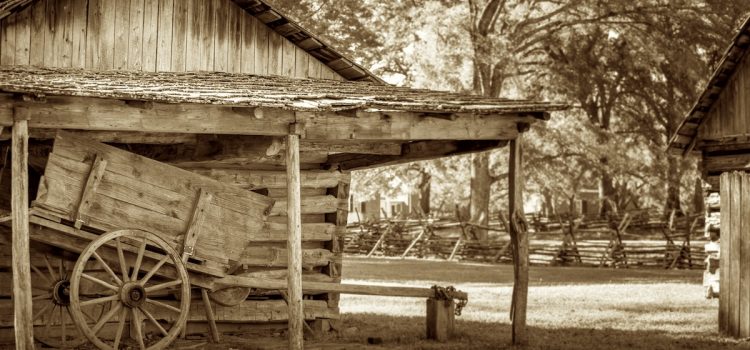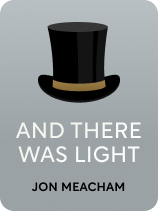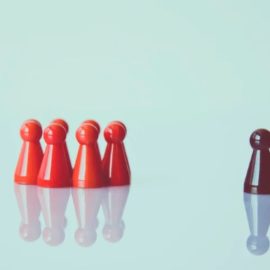

This article is an excerpt from the Shortform book guide to "And There Was Light" by Jon Meacham. Shortform has the world's best summaries and analyses of books you should be reading.
Like this article? Sign up for a free trial here.
What was Abraham Lincoln’s relationship with his father like? How did other children regard him? What influences formed his political views?
Pulitzer Prize-winning presidential biographer Jon Meacham describes Abraham Lincoln’s early life in his book And There Was Light. He provides insights into Lincoln’s parents, education, and faith that help us understand America’s 16th president.
Read more to learn about Abraham Lincoln’s early life.
Abraham Lincoln’s Early Life: 1809-1829
Abraham Lincoln was born on February 12, 1809, to a poor family in rural Kentucky. He was born in a small cabin on a farm called Sinking Spring. However, Meacham notes that Abraham Lincoln’s early life memories are of a different farm, Knob Creek, where his family lived until Lincoln was seven. In 1816, the family moved north to a settlement in Spencer County, Indiana, called Little Pigeon Creek.
(Shortform note: Today, Sinking Spring and Knob Creek are both tourist attractions under the purview of the US National Park Service. The Little Pigeon Creek community in Indiana is now known as Lincoln City, in honor of President Lincoln.)
Lincoln’s family moved to Little Pigeon Creek because his father could buy land much more cheaply in that area. This also moved the Lincolns to an area where the Northwest Ordinance of 1787 had made slavery illegal. So Lincoln spent this part of his childhood in an abolitionist culture, a place where most people favored outlawing (abolishing) slavery.
(Shortform note: It’s common to think of supporting slavery versus abolition as a purely moral or political issue, but understanding why so many people in the South supported slavery requires looking at the economic issues as well. The southern US was largely agrarian and relied on huge plantations to sustain local economies. Without the automated farming equipment we have today, plantation owners felt they needed enormous amounts of cheap labor to grow and harvest their crops, and slavery was their solution. This is not to say that all Southerners supported slavery—nor that all Northerners opposed it—but the trends do largely follow these economic differences.)
We’ll examine Lincoln’s childhood through his relationships with his family members, his education (which was largely self-driven), and his religion.
Lincoln’s Family
Meacham says that Lincoln’s life at home wasn’t happy. His mother, Nancy, was born out of wedlock, and local gossip portrayed Nancy as sexually immoral. Despite her reputation, Lincoln loved his mother and spoke well of her. Nancy died when Lincoln was only nine.
(Shortform note: Meacham relates most of the limited information that’s available about Nancy, but one thing he doesn’t mention is that she was largely responsible for educating young Abraham Lincoln. In fact, according to the Indiana state government’s website, Nancy was responsible for the insatiable curiosity and love of learning that drove Lincoln to expand his knowledge with every bit of reading material he could get.)
Lincoln’s relationship with Thomas, his father, was much more contentious. Thomas Lincoln was frequently angry, abusive—even by the standards of the time—and demeaning toward his son. As a form of rebellion, Lincoln liked to be intentionally rude when Thomas was around to embarrass him; this frequently led to physical punishments, which Lincoln endured stoically. Furthermore, Thomas hired Lincoln out to help their neighbors with chores and farm work, then kept the money Lincoln earned for himself.
(Shortform note: Some reports about Thomas Lincoln strongly conflict with what Meacham says here. For example, the National Park Service (NPS) says that Thomas was fairly wealthy, contrary to Meacham’s claim that the Lincolns were poor. The NPS also speculates that Lincoln’s kindness and his famous devotion to honesty were, at least in part, reflections of Thomas’s character—a contrast to the abuse and exploitation that Meacham describes in this book.)
Lincoln also had an older sister named Sarah, who died giving birth in 1828 at the age of 21. His younger brother, named Thomas after his father, died in infancy.
(Shortform note: Some historians believe that Abraham Lincoln suffered from depression, brought on in large part by the trauma of losing so many family members at a young age. Sarah’s death was especially devastating, as she’d taken over much of the work of raising him after their mother Nancy died.)
Lincoln’s Childhood Education
Meacham says that Lincoln was an unusual child in many ways. His classmates described him as a quiet loner, though polite. Even as a child, Lincoln had a reputation as a politician and mediator. He was often called on to settle disputes between boys his own age, and they usually respected his decisions.
Lincoln was naturally curious and obsessed with books—he read everything he could get his hands on, often shirking chores and work to do so. Those books made up most of Lincoln’s childhood education, as he had less than a year of formal schooling.
(Shortform note: Many people believe that Lincoln may have been on the autism spectrum. Some signs of autism are consistent with what Meacham describes here: for example, a reputation for being unusual or different from his peers and having a special interest—in this case, an interest in books. However, others argue that it’s unlikely because Lincoln was also renowned for his social skills, an area that people with autism tend to struggle with.)
Lincoln’s Religion
Lincoln was raised as a Baptist, an offshoot of Protestantism. Meacham says there was a strong connection between Lincoln’s faith and his morality. Specifically, Lincoln believed that his conscience was God speaking to him; therefore, doing the right thing was synonymous with doing God’s will. He also believed that God called upon all humans to be fair, merciful, and loving to one another. That conviction would guide many of Lincoln’s actions, both in politics and in his private life.
In addition to shaping his morality, Lincoln’s religious upbringing influenced his political views: Many Baptists opposed slavery, and abolition was a common topic in conversations and sermons. Furthermore, the Lincolns belonged to a religious organization called the Baptist Licking-Locust Association Friends of Humanity, which was dedicated to emancipation—in other words, freeing all enslaved people in the US.

———End of Preview———
Like what you just read? Read the rest of the world's best book summary and analysis of Jon Meacham's "And There Was Light" at Shortform.
Here's what you'll find in our full And There Was Light summary:
- The myths and legends that surrounded Abraham Lincoln
- Abraham Lincoln's life in chronological order, from his birth to his assassination
- What the Republican Party looked like in the 19th century






